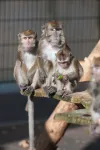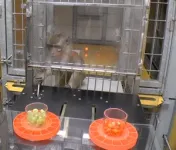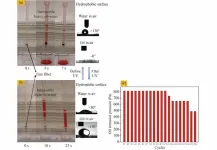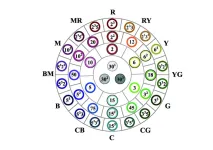(Press-News.org) Göttingen, March 2, 2023. A sense of fairness has long been considered purely human – but animals also react with frustration when they are treated unequally by a person. For instance, a well-known video shows monkeys throwing the offered cucumber at their trainer when a conspecific receives sweet grapes as a reward for the same task. Meanwhile, researchers have observed similarly frustrated reactions to unfair rewards in wolves, rats and crows. However, researchers still debate the reasons for this behavior: Does the frustration really stem from a dislike of unequal treatment, or is there another explanation? In a study with long-tailed macaques (Macaca fascicularis), researchers at the German Primate Center – Leibniz Institute for Primate Research (DPZ) have now confirmed an alternative explanatory approach in a collaborative project involving the Departments of Cognitive Ethology and Neurobiology. The team around Rowan Titchener, PhD student at the Georg-August-Universität Göttingen and researcher in the Department of Cognitive Ethology at the DPZ, showed that long-tailed macaques rejected an inferior reward more frequently if it is selected and allocated by a person. In contrast, if the reward is provided by an automatic feeder, they accept it. The researchers conclude that the monkeys refuse the reward out of social disappointment towards the experimenter – and not because they feel that they are at a disadvantage compared to a conspecific. (Royal Society Open Science).
Humans have a strong sense of equity. If we believe that resources are being unfairly or wrongly distributed, we make this clear – with protest. This controlling behavior promotes successful cooperation and partly explains why cooperation has been a winning strategy in human evolution.
Equal effort, same reward
However, not only humans protest when the same performance is rewarded differently for no apparent reason. Many animals are likewise dissatisfied with a reward that is perceived as comparatively inferior and react in a frustrated way. The characteristic behavioral patterns can be reliably reproduced in experiments across various species of birds, rodents and monkeys. The interpretation of this protest behavior, on the other hand, is controversial among researchers. If the animals' frustration stemmed from a comparison of their own reward with that of their conspecific, this would indicate an abstract understanding of equal treatment.
The root of disappointment
In the present study, the researchers tested three alternative explanations for protest behavior following unequal treatment. The first hypothesis invokes "inequity aversion" and presupposes social comparison with conspecifics and a sense of fairness. This is based on the idea that the pattern of rewards is compared between oneself and others so that it may be perceived as unfair. The second hypothesis, "food expectation", assumes the visibility of the attractive food as a trigger for frustration. Thus, if a high-quality reward is visible, the animal expects to receive it. The third hypothesis is based on "social disappointment" about the trainer's decision to provide an inferior reward. Behind this stands an expectation to be rewarded in the best possible way by the responsible human.
Disappointing human
The results of the current study on long-tailed macaques are in line with a previously published chimpanzee study. Rowan Titchener, lead author of the study, states: "The animals' response patterns are best explained by frustration with the human trainer's decisions. Thus, the current results speak for the third hypothesis, based on social disappointment". This interpretation is supported in particular by the fact that the long-tailed macaques accepted an inferior reward from an automatic feeder more often than from a human.
Experimental setup
The researchers confronted the monkeys with four different scenarios in the experiment. The procedure was always the same: The activation of a lever was followed by the reward of low-quality food, which was brought within reach by a small conveyor belt. High-quality rewards were displayed, but remained out of reach. The experimental design was varied in two ways: Firstly, either a human provided the reward, or it was administered by an automatic feeder; secondly, the animal was either alone, or a conspecific solved the same task within sight, but received higher-quality rewards.
Clear result
The monkeys almost never refused their reward when it was provided by the automatic feeder – but did so in more than 20 percent of the experiments in which a human offered the food. This behavioural pattern is consistent with social disappointment with the human who decides to give them the inferior reward. "The monkeys have no social expectations of a vending machine and are therefore not disappointed," Titchener explains.
Stefanie Keupp, leader of the study at the German Primate Centre, draws the conclusion: "A combination of social disappointment with the human experimenter and some degree of food competition best explains the behavior of the long-tailed macaques in our study."
END
Insights into the evolution of the sense of fairness
Long-tailed macaques react with disappointment when their expectations are not met
2023-03-02
ELSE PRESS RELEASES FROM THIS DATE:
Security vulnerabilities detected in drones made by DJI
2023-03-02
Researchers from Bochum and Saarbrücken have detected security vulnerabilities, some of them serious, in several drones made by the manufacturer DJI. These enable users, for example, to change a drone’s serial number or override the mechanisms that allow security authorities to track the drones and their pilots. In special attack scenarios, the drones can even be brought down remotely in flight.
The team headed by Nico Schiller of the Horst Görtz Institute for IT Security at Ruhr University Bochum, ...
Coastal water pollution transfers to the air in sea spray aerosol and reaches people on land
2023-03-02
New research led by Scripps Institution of Oceanography at UC San Diego has confirmed that coastal water pollution transfers to the atmosphere in sea spray aerosol, which can reach people beyond just beachgoers, surfers, and swimmers.
Rainfall in the US-Mexico border region causes complications for wastewater treatment and results in untreated sewage being diverted into the Tijuana River and flowing into the ocean in south Imperial Beach. This input of contaminated water has caused chronic coastal water pollution in Imperial ...
A bridge between hydrophobicity and hydrophilicity of flax fiber: A breakthrough in the multipurpose oil-water separation field
2023-03-02
The large number of oily wastewater discharges and oil spills are bringing about severe threats to environment and human health. Corresponding to this challenge, a number of functional materials have been developed and applied in oil-water separation as oil barriers or oil sorbents. These materials can be divided into two main categories which are artificial and natural.
Natural materials such as green bio-materials are generally low cost and abundant with biological degradability, which are also regarded as promising alternatives for oil-water separation ...
CityU scholars unify color systems using prime numbers
2023-03-02
Existing colour systems, such as RGB and CYMK, are all text-based and require a large range of values to represent different colours, making them difficult to compute and time-consuming to convert. Recently, researchers from City University of Hong Kong (CityU) made a breakthrough by inventing an innovative colour system, called “C235”, based on prime numbers, enabling efficient encoding and effective colour compression. It can unify existing colour systems and has the potential to be applied in various applications, like designing an energy-saving LCD system and colourizing DNA codons.
Currently, ...
UCD Archaeologist receives prestigious Dan David Prize for research on the invisible workforce behind ancient forms of art
2023-03-02
The Dan David Prize, the largest history prize in the world, has announced University College Dublin (UCD) Archaeologist, Dr Anita Radini, as one of nine recipients for 2023.
Each of the winners - who work in Kenya, Denmark, Israel, Canada, the US and Ireland - will receive $300,000 (USD) in recognition of their achievements as emerging scholars and to support their future endeavours in the study of the human past. Dr Radini is the first in Ireland to receive this award.
“Our winners represent the next generation of historians,” said Ariel ...
Putting a price tag on the amenity value of private forests
2023-03-02
When it comes to venturing into and enjoying nature, forests are the people’s top choice – at least in Denmark. This is also reflected in the sales prices of properties with private forest. But beyond earnings potential, this first study of its kind, conducted by the University of Copenhagen, puts a price tag on the so-called amenity value of Danish private forests.
Forests have a nearly therapeutic effect on humans. Perhaps that is why eight out of ten of Danes have wandered in the woods over ...
The map to human and animal behavior
2023-03-02
What are humans? What are animals? And what makes humans unique? The comparative psychologist Fumihiro Kano has set himself a life goal to answer those questions. On 28 February 2023 it was announced that the scientist from the Cluster of Excellence “Centre for the Advanced Study of Collective Behaviour” (CASCB) at the University of Konstanz will receive the Manfred Fuchs Prize from the Heidelberg Academy of Sciences and Humanities of the State Baden-Württemberg for his interdisciplinary work in animal behaviour research.
Photo gallery for the article: https://www.campus.uni-konstanz.de/en/science/the-map-to-human-behaviour
Fumihiro ...
Resistance training improves sleep quality and reduces inflammation in older people with sarcopenia
2023-03-02
Sarcopenia is the decline of skeletal muscle mass with age, leading to loss of muscle strength (to move objects, shake hands etc.) and performance (walking and making other routine movements effectively). It involves chronic inflammation and is associated with cognitive alterations, heart disease and respiratory disorders. In short, it affects the quality of life, reducing independence and increasing the risk of injury, falls and even death.
Sarcopenia affects 15% of adults over the age of 60 and 46% of those over 80. Sleep disorders are also common in these age groups. The aging ...
Bald eagles aren’t fledging as many chicks due to avian influenza
2023-03-02
Bald eagles are often touted as a massive conservation success story due to their rebound from near extinction in the 1960s.
But now a highly infectious virus may put that hard-fought comeback in jeopardy.
Published in Nature’s Scientific Reports, new research from the University of Georgia showed highly pathogenic avian influenza, also known as H5N1, is killing off unprecedented numbers of mating pairs of bald eagles.
“Even just one year of losses of productivity like we’ve documented regionally is very concerning and could have effects for decades to come if representative of broader regions,” said ...
New podcast gives parents a “Pediatrician Next Door”
2023-03-02
Imagine if harried parents could get the scientific and clinical expertise of a pediatrician just by walking only a few steps next door. That’s the premise of a new podcast, The Pediatrician Next Door, by Dr. Wendy Hunter, M.D. She brings decades of experience in emergency and primary pediatric care to answer burning questions that parents are reluctant to ask.
“In the emergency room, I saw a great many frustrated parents and their kids who didn’t always get their questions answered by their pediatrician because there just wasn’t time in the clinic,” said Dr. Hunter. “Or, they didn’t have access to their ...
LAST 30 PRESS RELEASES:
Public and patient involvement in research is a balancing act of power
Scientists discover “bacterial constipation,” a new disease caused by gut-drying bacteria
DGIST identifies “magic blueprint” for converting carbon dioxide into resources through atom-level catalyst design
COVID-19 vaccination during pregnancy may help prevent preeclampsia
Menopausal hormone therapy not linked to increased risk of death
Chronic shortage of family doctors in England, reveals BMJ analysis
Booster jabs reduce the risks of COVID-19 deaths, study finds
Screening increases survival rate for stage IV breast cancer by 60%
ACC announces inaugural fellow for the Thad and Gerry Waites Rural Cardiovascular Research Fellowship
University of Oklahoma researchers develop durable hybrid materials for faster radiation detection
Medicaid disenrollment spikes at age 19, study finds
Turning agricultural waste into advanced materials: Review highlights how torrefaction could power a sustainable carbon future
New study warns emerging pollutants in livestock and aquaculture waste may threaten ecosystems and public health
Integrated rice–aquatic farming systems may hold the key to smarter nitrogen use and lower agricultural emissions
Hope for global banana farming in genetic discovery
Mirror image pheromones help beetles swipe right
Prenatal lead exposure related to worse cognitive function in adults
Research alert: Understanding substance use across the full spectrum of sexual identity
Pekingese, Shih Tzu and Staffordshire Bull Terrier among twelve dog breeds at risk of serious breathing condition
Selected dog breeds with most breathing trouble identified in new study
Interplay of class and gender may influence social judgments differently between cultures
Pollen counts can be predicted by machine learning models using meteorological data with more than 80% accuracy even a week ahead, for both grass and birch tree pollen, which could be key in effective
Rewriting our understanding of early hominin dispersal to Eurasia
Rising simultaneous wildfire risk compromises international firefighting efforts
Honey bee "dance floors" can be accurately located with a new method, mapping where in the hive forager bees perform waggle dances to signal the location of pollen and nectar for their nestmates
Exercise and nutritional drinks can reduce the need for care in dementia
Michelson Medical Research Foundation awards $750,000 to rising immunology leaders
SfN announces Early Career Policy Ambassadors Class of 2026
Spiritual practices strongly associated with reduced risk for hazardous alcohol and drug use
Novel vaccine protects against C. diff disease and recurrence
[Press-News.org] Insights into the evolution of the sense of fairnessLong-tailed macaques react with disappointment when their expectations are not met










